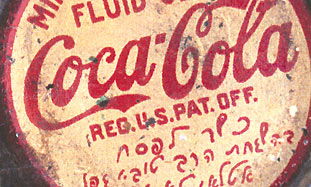Coca-Cola 'the Real Deal' for Gastrointestinal Clogs

The original kosher Coca-Cola bottle top.
by: Judy Siegel-Itzkovich | The Jerusalem Post
January 7, 2013
When cars had metallic bumpers, sodas were used to polish them, and popular acidic soft drinks has also been known to be a good toilet-bowl cleaner.
Now, Greek gastroentrologists headed by Dr. Spiros Ladas at Athens University Medical School and Laikon Hospital have published a study proving that drinking Coca-Cola (the brand name provided in the article) can open up clogs in people with overly convoluted gastrointestinal systems caused by the ingestion of digested fruits and vegetables. They published their findings on Monday in the journal Alimentary Pharmacology and Therapeutics.
In the past decade, 24 scientific papers involving 46 patients have been published around the world. Such clogs are called phytobezoars.
Drinking Coca-Cola, the researchers said, and sometimes the use of endoscopy, dissolved the phytobezoars of over 90 percent of the patients, making open gastric surgery unnecessary.
Phytobezoars are composed of indigestible cellulose, tannin and lignin from ingested vegetables and fruits, including pineapples and persimmons - which are not harmful to healthy people but can cause clogs in those who have previously undergone gastrointestinal surgery or suffer complications resulting from diabetes.
The clogs involving pineapples and persimmons are called diospyrobezoars and are the most difficult to break up. Persimmons are very popular in the Far East, and as they are eaten with the skin, they cause problems in people who previously underwent gastrointestinal surgery.
Conservative medical treatment to dissolve the bezoars has included the provision of proteolytic enzymes, cellulase to eliminate cellulose, or the introduction of an endoscope to try to break up the clog. When the Greeks first published in 2002 the possibility of using Coca-Cola - either by drinking it or by gastric lavage (stomach pumping) - it was tried at various medical centers.
Now the researchers are able to pronounce the soft drink therapy a success. Even without using an endoscope, Coca-Cola dissolves bezoars in half of all cases, they wrote, thus drinking it "should be considered the treatment of choice" in such cases. "Moreover, availability, low cost, rapid way of action, simplicity in administration and safety renders Coca-Cola a cost-effective therapy for gastric phytobezoars," the study said.
Asked to comment, Prof. Yaron Niv - chief of gastroenterology at the Rabin Medical Center- Beilinson Campus, Petah Tikva - told The Jerusalem Post that, as it happens, "Ladas is a very good friend of mine and told me about this observation a while ago."
As chronic drinking of highly sweetened beverages such as cola has been blamed by health experts for being involved in the development of obesity and by dentists for tooth decay, it should not be recommended to people for medical treatment if they do not have bezoars.
Related Articles
New and Unique Procedure for Back Pain
Almost 1/3 of the overall world population will suffer from some type of back pain. Now for some there is an alternative to conventional surgery.
Israeli Researchers Identify Protein that Protects Brain Cells from Parkinson's
The protein, called NID-13, has proven effective in lab mice; researchers have registered a patent.
Japanese Healing Art Enhances Birthing Process
The Schneider Women's Hospital at RMC strives to provide new and modern techniques to enhance the birthing process, and has now introduced the use of shiatsu techniques.